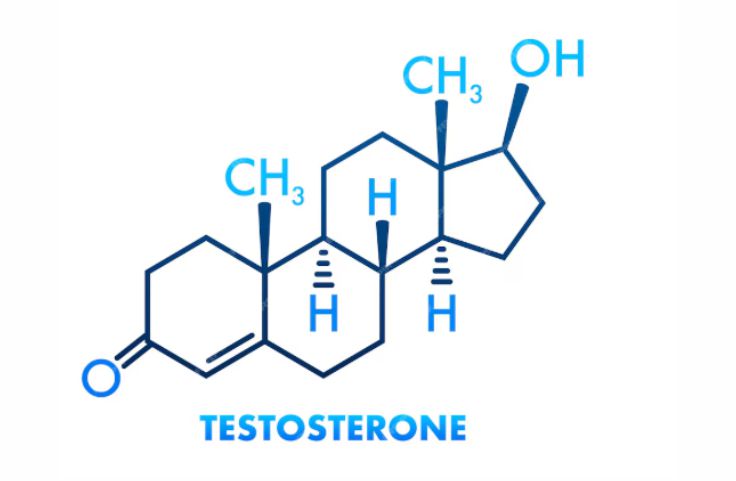Last updated on November 15th, 2025 at 11:52 pm
Testosterone fuels male strength, drive, and vitality. This ultimate guide breaks down what it does, why it matters, and how to keep it working for your body and mind.
You’ve probably heard that testosterone gives you strength, stamina, and sex drive. But there’s more to it.
This hormone quietly shapes how you feel, think, function, and your overall health and wellness as a man.
As you move past your 30s and into your 40s or 50s, changes in your mood, muscle tone, and focus might leave you wondering what’s going on.
That’s where this guide comes in. It’s not here to confuse you with medical jargon or hype.
Instead, you’ll get real talk about what testosterone does in your body, how it affects your energy, and what signs might point to low levels.
You’ll also find practical ways to support it through your food, movement, and sleep.
If you want to take charge of your health, it starts with understanding the hormone that powers your performance and mindset.
Related: Top Testosterone Boosters for Men
What is Testosterone?
Testosterone is the primary hormone behind male development, driving traits like facial hair, muscle growth, and sex drive.
Produced mainly in the testes, it also supports sperm production, bone strength, mood, and energy.
Levels usually peak in early adulthood, then begin to decline around age 30, which can lead to fatigue, low libido, or emotional shifts.
This drop may indicate low testosterone, or hypogonadism. Normal levels range from 300 to 1,000 ng/dL and vary with age, health, and lifestyle.
Monitoring your testosterone helps you catch imbalances early and make informed choices to support your physical and mental health.
Recommended: Natural Foods that Increase Testosterone Level
Understanding Testosterone: More Than Just a Hormone

This male hormone isn’t just about muscles or sex drive. It shapes how you respond to stress, how you carry yourself, and how you define who you are as a man.
Testosterone Shapes How You Feel and Think
Your levels influence more than physical strength. They affect motivation, mood, and how you handle daily pressure.
When hormonal balance drops, so does your energy and mental clarity. You may feel dull or less interested in things you used to care about.
At higher levels, you might notice more confidence, drive, and risk-taking. This isn’t just personality.
It’s your biology speaking. Recognizing that link can help you take better control of your performance and well-being.
It’s Tied to the Way Society Sees You
Whether you notice it or not, people respond to your posture, your presence, and how assertive you seem.
Testosterone plays a quiet role in all of this. Higher levels can show up as leadership qualities, strength, calm control, and quick decision-making.
But lower levels don’t make you any less of a man. Your behavior, shaped by hormones and mindset, impacts how the world reacts to you.
You’re Pressured to Perform Like Your Hormones Are Perfect
You’re expected to be sharp, calm, focused, and strong, even when your body is running on low fuel.
Processed food, poor sleep, and too much screen time all weaken your biological drive.
The pressure stays the same, but your system is struggling. Instead of blaming yourself, ask what’s throwing off your internal rhythm.
Understanding how your male hormone works gives you better tools to adjust, respond, and stay in control.
Masculinity Is Changing, but Biology Hasn’t Caught Up
Modern expectations ask you to be more emotionally open, less aggressive, and more balanced, but your biology hasn’t rewritten itself.
Testosterone doesn’t follow social trends. Your system is built for structure, challenge, and purpose.
That’s not outdated, it’s how you’re wired. Once you understand how this hormone affects your behavior, you stop chasing stereotypes and start living in a way that fits your nature.
Related Posts
High Testosterone in Men and How to Manage It
Muscle Health and Growth: The Role of Testosterone
Surprising Men’s Health Tips for Longevity
Foods Men Should Keep Away From
Men’s Health After 50: What to Expect
Virility Meaning: A Vigor Guide For Men
Men and Sleep: Everything to Know
How Testosterone Affects the Body

You may not always notice it, but your male hormone quietly powers many parts of your body. From strength to focus, it supports how you perform and feel each day.
Muscle growth and strength
When your androgen levels are in a good range, you build muscle more easily.
This hormone helps your body repair tissue after training and increases your ability to handle physical stress.
If your levels dip, you may feel slower in the gym or struggle to add lean mass.
Balanced hormones also improve recovery and stamina.
If staying strong matters to you, tracking your hormonal health is part of the equation.
Fat distribution and metabolism
Your male hormone helps your body decide what to store and what to burn.
Low levels can lead to more belly fat and sluggish metabolism. You might notice energy dips or slower fat loss despite your efforts.
Keeping your testosterone balanced supports a more efficient metabolism and a better shot at staying lean and energized.
Bone density and strength
Bone is living tissue, and it responds to hormonal shifts. When your levels drop, the cells that build and protect bone slow down.
You might not notice it early on, but over time, weak bones can lead to pain, fractures, or posture changes.
Steady hormone support helps maintain strong bones, especially as you get older. Think of it as long-term protection for your frame and stability.
Mood and mental focus
This hormone shapes more than your body; it also influences how you feel inside. Low levels may leave you feeling off, less motivated, or mentally foggy.
You might snap more easily or find it harder to stay focused. Balanced testosterone supports mood, memory, and mental energy.
If your mind feels out of rhythm, checking your hormone levels can help you get back on track.
Related: Morning Routines that Boost Testosterone Level
The Testosterone Decline: Natural or Engineered?

Testosterone levels in men have dropped significantly over recent decades, sparking debate over whether this trend is natural or driven by modern life.
While it’s true that testosterone gradually declines with age, studies show that men today have lower levels than men of the same age a generation ago.
This suggests something deeper is at play. Environmental estrogens, found in plastics, food packaging, and personal care products, can mimic estrogen and disrupt your body’s hormonal balance.
At the same time, modern habits like excessive screen time, lack of physical activity, and poor diets filled with processed foods and sugars contribute to obesity and inflammation, both linked to reduced testosterone.
These combined influences may be creating a hormonal environment that works against your biology.
While some decline is expected, the speed and scale suggest that modern life could be engineering this fall.
Understanding the root causes is key to taking back control of your health.
Symptoms of Low Testosterone

When testosterone levels drop, everything from your strength to your mindset can change.
The signs may start with small, sluggish workouts, muscle loss, or increased belly fat despite eating the same.
Over time, constant fatigue, lower sex drive, and mood changes begin to affect how you live and feel.
You may wake up tired, feel emotionally flat, or notice your motivation slipping.
These aren’t just signs of getting older; they could point to a hormonal imbalance.
Paying attention early helps restore balance before symptoms worsen.
If you’ve noticed these changes, it may be time to check your hormone health.
Read more about the signs of low testosterone in men to understand what your body is telling you and how to respond.
The Testosterone-Masculinity Disconnect

Many believe that having high testosterone automatically makes you more masculine, more confident, dominant, or assertive.
But that link is not as solid as it’s made out to be. While this hormone does influence certain behaviors, it doesn’t guarantee emotional control, maturity, or healthy relationships.
Some men with higher levels may show more aggression or struggle to regulate their emotions.
The media’s idea of the “alpha male” reinforces a narrow version of manhood built around toughness and control, ignoring traits like empathy, patience, and emotional depth. Masculinity is more than a chemical profile.
It’s about how you treat others, how you carry yourself under pressure, and what values guide your choices.
When you define manhood through hormones alone, you overlook what builds strength and respect.
The disconnect between testosterone and character invites you to look deeper and live beyond outdated labels of what a man should be.
Are You Low T, or Just Living a Low-Drive Life?

Fatigue, low libido, and mood shifts can signal low testosterone, but so can a life lacking purpose.
It’s easy to confuse hormonal decline with emotional burnout. Low testosterone affects energy, motivation, and mood, but your habits and mindset play a role too.
A poor diet, inactivity, and chronic stress can lower testosterone production.
On the other hand, exercise, good sleep, and a sense of purpose can support healthy hormone levels.
Sometimes, what feels like Low T is a lack of drive rooted in unfulfilling routines.
Ask yourself: Are you tired from low testosterone, or from a life that drains you?
Reflecting on your goals and values can help you reconnect with purpose and reignite both your mindset and your biology.
Testosterone doesn’t work in isolation; it responds to how you live, what you chase, and the meaning you attach to your days.
The Misguided Goal of Boosting Testosterone

You’ve probably heard that more testosterone means more strength, more sex drive, and better performance.
But chasing high numbers without understanding balance can do more harm than good.
More hormones aren’t always healthier
Pushing your testosterone beyond your natural range can backfire. You may notice mood swings, restlessness, or even higher blood pressure.
These changes aren’t signs of progress; they’re warnings. High levels can also mask deeper issues, like poor sleep or unaddressed stress.
Instead of blindly boosting, ask yourself what’s missing. Sometimes, you don’t need more testosterone; you need better balance in how you live.
Your body already knows its sweet spot
There’s no magic number for every man. Your best hormone range is the one where you feel strong, clear-headed, and motivated without crashing later. That sweet spot is personal.
It responds to how you eat, move, and rest. The goal isn’t maximum, it’s steady. Pay attention to how your body feels instead of chasing lab numbers that don’t reflect real life.
Lifestyle is the real hormone booster
You don’t need shortcuts. Regular movement, solid sleep, clean eating, and mental calm all support your hormones naturally.
These habits help you build sustainable energy, better focus, and lasting drive.
If you’re constantly tired, unmotivated, or anxious, it may be time to reset your routine, not inject a fix.
Your hormones work best when your lifestyle works for them, not against them.
Causes of Low Testosterone

Causes of low testosterone in men go beyond age.
While hormone levels naturally decline after your 30s, lifestyle and health choices play a big part too.
Extra body fat, poor nutrition, and little exercise can throw your hormones off balance.
Processed foods, sugar, and inactivity slow your body’s natural production, while strength training and cleaner eating help restore it.
Stress, sleepless nights, and exposure to toxins also weaken testosterone levels by raising cortisol and disrupting recovery.
Some medical issues, like diabetes, thyroid disorders, or medications, can further lower hormone output.
The good news is that many of these causes are within your control.
With better habits and awareness, you can support healthy testosterone and keep your energy, focus, and strength steady.
See a dedicated post on the causes of testosterone in men.
How Digital Habits Are Impacting Testosterone Levels

Digital life has changed how you move, sleep, and spend time. What feels normal, sitting, scrolling, watching, can quietly shift your hormone balance and affect how you feel as a man.
Sedentary routines reduce hormone production
If most of your day is spent sitting at work, in traffic, or in front of a screen, your hormone levels may start to slide.
Long hours of stillness tell your body that strength and energy aren’t needed. The result is slower testosterone production.
This change won’t hit overnight, but it adds up fast. Your body needs movement to send the right signals.
Without it, your drive, mood, and physical performance can begin to fade.
Too much screen time weakens your rhythm
When your day stretches into long sessions of scrolling, streaming, or gaming, it’s not just your eyes that feel the strain.
Your natural body clock gets thrown off, especially at night.
Blue light from phones, tablets, and laptops delays melatonin release and blocks deep sleep.
Poor sleep disrupts testosterone release. Over time, low-quality rest can affect your mood, memory, and sex drive, quiet signs that your digital routine may need a reset.
Working from the screen is not the same as working
Even productive screen use, remote jobs, emails, and research, still keep you seated and disconnected from movement.
Compared to men in active jobs, those behind desks tend to show lower hormone levels. It’s not the effort that’s missing; it’s the physical demand.
Your body adapts to what you ask of it. If work doesn’t push you physically, you’ll need to find ways to stay active outside of it.
Hormonal health depends on it.
Boundaries protect your body and your focus
You don’t have to quit screens, you just need limits. Set time blocks for movement. Step outside. Walk after meals.
Stretch every hour. Keep your phone out of bed. These small actions protect your sleep, improve your focus, and support balanced testosterone production.
When you take charge of your digital habits, your body starts to respond. Balance doesn’t require cutting out tech, just using it with more intention.
The T-Gut Axis: Understanding Hormones and Gut Health
Your gut does more than process food. It helps shape your hormone balance, too.
If your digestion is off, your testosterone might be too, and that’s not a coincidence.
A weak gut affects your hormone signals
When your gut lining becomes too porous, known as leaky gut, it triggers inflammation that disrupts hormone production.
Your testosterone levels may dip as your body works to manage that stress.
A damaged gut also means poor nutrient absorption, which affects how your body makes and balances hormones.
If you’re dealing with digestive issues, don’t ignore them. They might be messing with more than just your stomach.
Gut bacteria and estrogen imbalances
The bacteria in your gut help break down and eliminate hormones.
When those bacteria are off balance, it can lead to a buildup of estrogen. Higher estrogen can lower testosterone.
You may notice body changes, mood shifts, or stubborn belly fat.
Restoring your gut microbiome through diet, fiber, and probiotics can support proper hormone clearing and protect your hormonal balance over time.
Food choices send clear messages to your hormones
Junk food, fried meals, and added sugars hurt both your gut and your testosterone.
On the other hand, whole foods, vegetables, fruits, healthy fats, and fermented items feed your digestive system and support stable hormone levels.
Nutrients like zinc, magnesium, and vitamin D are key for male hormone health.
Build your meals with purpose, and your gut will reward you by supporting better energy, mood, and recovery.
Mindful eating helps your gut do its job
It’s not just what you eat, it’s how you eat. Slow down. Chew properly. Pay attention to how your body reacts to certain foods.
If something causes bloating or fatigue, listen. Cut out inflammatory triggers and increase fiber gradually.
This helps strengthen your gut wall and allows your body to absorb the nutrients needed to keep your testosterone levels in balance. Every bite matters more than you think.
Testing and Diagnosis
If you’ve been feeling off, low energy, poor focus, or less drive, a hormone check might give you answers. See testosterone test and interpretation.
Testing testosterone is straightforward and provides insight into your hormonal health.
Morning blood tests, taken between 7 and 10, give the most accurate picture because hormone levels fluctuate during the day.
Total testosterone tests measure both bound and unbound hormone, showing your overall supply, but not all of it is usable.
Free testosterone tests reveal the portion your body can actively use for energy, mood, muscle repair, and libido.
Interpreting results requires context, age, symptoms, and overall health influence what’s normal.
A single low reading may not indicate a problem, so doctors usually recommend a second test.
Testing is important if you notice persistent low energy, reduced sex drive, or muscle loss.
Getting accurate data helps you understand your hormone levels and take informed steps for restoring balance and supporting male health naturally.
Treatment Options for Low Testosterone

When your testosterone drops, it can affect more than your drive. The right treatment should fit your body, your routine, and how you want to feel moving forward.
Hormone replacement therapy raises levels fast
Your doctor may suggest hormone replacement therapy using gels, patches, injections, or pellets.
Each option aims to bring your testosterone into a better range. It can boost your energy, focus, and muscle recovery.
But results vary by person, and you’ll need regular tests to monitor your progress. Start with a full health review so your treatment plan works with your lifestyle, not against it.
Side effects mean you need close monitoring
HRT comes with benefits, but it also brings risks. Some men report sleep trouble, skin changes, or prostate swelling.
In some cases, it may affect heart health or worsen hidden conditions. This is why doctors monitor your levels, blood work, and symptoms over time.
A smart approach means watching the big picture, not just chasing higher testosterone numbers without asking what your body truly needs.
Strength training supports your hormone balance
Exercise, especially lifting weights and cardio, can naturally raise testosterone. You don’t need a strict gym plan.
Just move more, push your muscles, and stay consistent.
Regular movement also improves your sleep, blood flow, and insulin response, all of which impact hormone production.
If you’ve been inactive, even small steps like walking daily or bodyweight training can lead to noticeable improvements in how you feel.
Food matters more than you think
The right meals help your body make and manage testosterone.
Whole foods rich in healthy fats, minerals, and protein should be your go-to.
Focus on things like eggs, fatty fish, nuts, spinach, and seeds.
Stay away from processed meals and sugary snacks; they can slow your metabolism and disrupt hormone balance. Eat to fuel your system, not just to feel full.
Smart supplements can support the process
Supplements like zinc, vitamin D, and magnesium may help your body maintain normal testosterone levels. But don’t go overboard.
Taking too much without medical advice can create new problems. Always check with your doctor before adding anything new.
Supplements work best when they fill small gaps, not when they try to do all the work. Start with food first, then fine-tune if needed.
Lifestyle Changes to Boost Testosterone Naturally
Supporting healthy testosterone naturally starts with simple, consistent lifestyle changes.
Focus on nutrient-rich foods like lean meats, nuts, shellfish, fatty fish, and vitamin D sources to fuel hormone production.
Strength training and high-intensity exercise trigger testosterone release, while cardio improves circulation and endurance.
Managing stress through mindfulness, walking, or deep breathing keeps cortisol in check, protecting testosterone levels.
Prioritize seven to nine hours of quality sleep to allow your body to repair and reset hormones.
Consistent meal timing with whole foods supports blood sugar and hormone balance.
These practical habits collectively enhance energy, muscle strength, libido, and overall male health.
For a detailed guide on specific exercises, foods, and routines to naturally boost testosterone, see our full post on lifestyle changes to boost testosterone naturally.
The Importance of Brotherhood and Male Community on Testosterone Health
You’re wired for connection. The company you keep, especially among other men, can shape not just your mood or mindset, but also how your body makes and maintains testosterone.
Being around other men raises your energy
Spending time with other men doing real things, training, building, competing, or even talking, can lift your drive.
Your testosterone responds to social dynamics. When you’re part of a strong group, your body feels that strength and responds.
You don’t need to dominate the group. Just showing up and sharing space where effort and challenge are part of the bond can push your hormone levels upward.
Isolation quietly lowers your drive
When you go through life without a regular connection, your system slows down. Studies link social disconnection to lower testosterone.
You might not notice it right away, but it builds over time.
You feel less motivated, more tired, and not quite yourself.
This isn’t just about feelings, it’s chemistry. Staying isolated shrinks your energy and weakens your hormonal rhythm.
Shared struggle builds stronger bonds and stronger hormones
Men connect best through doing, not just talking. Shared effort, challenge, or physical activity with other men sparks natural testosterone spikes.
Think of pickup games, lifting sessions, or group hikes. These moments push your body and mind.
They also build trust and respect. That sense of belonging, plus the physical challenge, is a powerful mix for both confidence and hormone health.
Brotherhood gives you room to open up
Having real friends, the kind you can be honest with, matters.
The male community isn’t just about pushing hard. It’s also about having space to speak your truth without judgment.
When you feel supported, your stress drops. That matters because chronic stress drives testosterone down.
Brotherhood gives you relief and balance. It’s not a weakness to connect. It’s smart chemistry.
Conclusion
Testosterone is a key driver of male vitality, shaping strength, mood, and confidence.
Understanding its role empowers men to take control of their health.
While levels naturally decline with age, modern factors like poor diet, inactivity, and stress accelerate this drop.
By prioritizing exercise, nutrition, sleep, and community, men can naturally support their hormonal balance.
Testing and lifestyle changes offer practical ways to address low testosterone without chasing quick fixes.
Ultimately, aligning habits with biology encourages energy, purpose, and resilience, allowing men to live fully in tune with their nature, regardless of societal pressures or stereotypes.
Frequently Asked Questions
What are the signs of low testosterone in men?
Low testosterone can show up as fatigue, muscle loss, weight gain around your belly, low sex drive, and mood issues like irritability or low motivation.
How can I naturally boost my testosterone levels?
Stick to strength training, eat whole foods with healthy fats and zinc, get enough sleep, and manage daily stress. These habits help support healthy testosterone levels.
What foods increase testosterone production?
Foods like eggs, fatty fish, spinach, nuts, lean meats, and shellfish can support testosterone. They’re rich in key nutrients like zinc, magnesium, and vitamin D.
Does low testosterone affect mental health?
Yes. Low testosterone is linked to mood swings, low motivation, mental fog, and emotional dullness. You might feel less like yourself without knowing why.
When should I get my testosterone levels tested?
If you feel persistently tired, lose interest in sex, struggle with muscle loss, or feel mentally off, a morning blood test can give you accurate answers.
References
Pyo Merez is a men’s lifestyle enthusiast and writer about the gentleman’s place and impact on society. Raised by a distinguished gentleman dad, he offers unique insights into how the mind of a gentleman works and how societal norms shape gentlemen’s identity and vice versa.
Through his insightful articles, Pyo taps into the depths of gentleman culture to provide perspectives on etiquette and manners in modern society.

